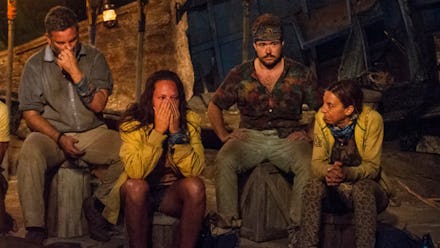Jeff Varner on outing Zeke Smith on 'Survivor': "It's just that ugly"

On Wednesday night's Survivor: Game Changers, gay North Carolina realtor Jeff Varner outed fellow castaway Zeke Smith as transgender. It was a surreal moment that caused a huge online backlash. After the airing, Varner issued an apology in which he characterized the act of outing as assault. But what's more disturbing is that Varner is a member of the LGBTQ community, and he chose to disrespect another queer person's coming-out process.
In a phone interview with Mic, Varner refuted that he seemed to use Smith's gender identity as a way to get ahead in the game.
"There was no decision made to talk about the trans status. It just came out," Varner said. "It was a knee-jerk thing."
And though in his apology Varner said he makes "no excuses" for what he did, he did say that being on the island makes people act out of character.
"None of us can hold any of us accountable for our behavior in that Survivor game," Varner said. "It's just that ugly, and we're not in our right minds when we're out there in the middle of that situation."
Varner said it was "unfortunate" that the show's editing made it seem like he was using someone's gender identity as part of his strategy.
Though he called Smith's not coming out "a deception" during the tribal council, Varner told Mic that he knows that's not the reality.
"No, I do not believe that transgender LGBT people are deceptive," Varner said. He added that trans and queer people who don't come out are "often trying to protect" themselves.
Varner's characterization of Smith as "deceptive" is a common and harmful myth often used to justify anti-trans violence, including the killing of Brandon Teena, whose story was immortalized in the film Boys Don't Cry. It's also a huge factor in violence against transgender women. In every state except California, it's still okay to use the "gay panic" defense or the "trans panic" defense as justification for an assault against LGBTQ people, making "but he didn't tell me!" a legal failsafe against punishment.
Cisgender white gay men enjoy the most privilege of anyone in the queer community. Like Varner did with his outing, gay men often use their privilege to oppress, rather than aid, trans gay men. Tumblr pages like Trans Men on Grindr show the many ways — from sexism to ableism to body-shaming to vaginaphobia — that cisgender gay men make queer spaces unsafe for trans gay men.
Transgender gay men face overlapping layers of stigma while trying to mingle with their cisgender counterparts. They deal with being called hateful slurs and even receiving death threats just for flirting.
Though Varner and Smith did exchange a hug, Varner said the show edited out the hugs and kisses he received from the cast, as well as host Jeff Probst defending him, saying there's "not a hateful bone" in his body.
Varner maintains that he was not playing the ally card.
"I was not really understanding in that moment that Zeke was not out," he said. "I felt like everyone was using this moment to make me into this hateful, bigoted person. That person that I fight against all the time. That's not who I am."
After members of the cast and Probst pushed back on Varner, telling him what he did was wrong, Varner tried to defend himself by pointing to his own advocacy work.
"I argue for the rights of transgender people every day in the state of North Carolina," he said.
Though Varner says he fought against HB2, his use of the word "deception" to describe the fact that Smith had not come employed the same logic North Carolina Republicans used to deny transgender people the right to use the bathroom of their choice. State conservatives were concerned that trans women were men looking to deceive others and gain access to public restrooms to molest women and young girls.
Varner said that, upon returning home from shooting, he spent time with a therapist and spoke to God about what he did. He also saw firsthand what happens during a negative coming-out process as his boyfriend was coming out to a conservative, religious family.
"It felt like I was living my own punishment for months," Varner said.
"I own it. I did it, and I will spend the rest of my life working to make that right," he said. "There's no excuse for it."
That transgender people are allowed to control their narrative is essential. Varner's decision, whether conscious or unconscious, took away Smith's liberty to define himself — and by extension his personhood. But, Varner contends, he understands the gravity of what he did.
"I understand the pain that what I did unleashed on the world." He added, "I don't need to prove to anyone why I'm an ally."